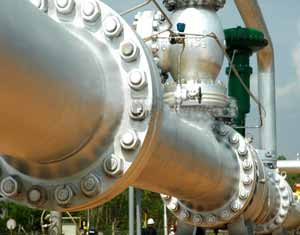26.07.2008
July 18, 2008 (the date of publication in Russian)
Sergey Pravosudov
GAS VS BIOFUELS
Russia can improve the environmental situation across the European continent
 During recent years, officials from the European Commission have repeatedly expressed concerns over Europe's dependence on Russian oil and gas deliveries, urging EU nations to boost production of biofuels. As a result, huge areas of agricultural lands were yielded for cultivation of coleseed. Not surprisingly, food prices have increased.
During recent years, officials from the European Commission have repeatedly expressed concerns over Europe's dependence on Russian oil and gas deliveries, urging EU nations to boost production of biofuels. As a result, huge areas of agricultural lands were yielded for cultivation of coleseed. Not surprisingly, food prices have increased.
Recently, Gazprom's CEO Alexei Miller indicated that the effort to replace the traditional motor fuel with biofuels is fraught with a global food crisis. Meanwhile, natural gas as a replacement for gasoline and diesel oil is a real alternative. Already today, the haulage of an auto running on gasoline is 1.7 times more costly than that operating on natural gas. Gazprom offers Europe to jointly spawn a large-scale network of gas-filling stations in EU states. Alexei Miller reminds that natural gas is much less hazardous for the environment than traditional oil products.
If calculated in reference fuel, natural gas is significantly cheaper than oil. This fact is commonly explained with wholesale purchase of natural gas, used primarily for industrial needs. However, many governments stimulate use of gas for filling cars, especially in large cities, as in combustion of gas the amount of noxious substances emitted into the atmosphere is far smaller.
UN's European Economic Commission has developed a strategy of replacing one fifth of European gasoline with alternative fuel, including methane. The implementation of UN's plans is to be promoted by the concept of developing "blue corridors" that suggests establishing international shipments of predominantly compressed natural gas as motor fuel. Such gas routes are planned to be developed also in South-Eastern Asia and South America. In Europe, it is already embodied in a plan, close to practical implementation.
In particular, the European Business Congress made a decision in 2007 to allocate financial support for preparation of the feasibility study of the "Blue Corridor" project, suggesting gasification of auto routes Helsinki-St. Petersburg-Moscow, Moscow-Minsk-Warsaw-Berlin and Berlin-Rome. In order to materialize the project, the involved sides are going to establish a joint corporation named Euroautogas. The legal status and the shareholders of the consortium are not yet determined. However, the project is supposed to involve major European energy corporations, transport companies, machine-building firms etc.
Unification of the efforts of Russia and the European Union would succeed in improvement of the environment on the continent, and to expand the lands used for agriculture in order to resolve the food crisis.
Countries, crossed by the "blue corridors", are supposed to create favorable conditions for Euroautogas by providing tax and customs privileges, as well as preferences in providing land for gas filling stations. This would benefit the increase of production of cars, using "blue fuel" that is presently available for most of the major European auto producers. Large-scale production of such cars will boost the expansion of the network of gas filling stations.
In Russia, transition to gas fuel significantly depends on incentives for its development.
By today, Gazprom that owns around 200 gas filling stations is the vanguard in this transition. The company has been insisting on replacement of oil products with gas for over 14 years. Only in 2006, these proposals were noticed by the Government. Therefore, we have grounds to hope that in the nearest future, the State Duma will adopt the law "On use of alternative motor fuel" and other legislative acts, accelerating the implementation of progressive technologies. By today, the corporation relies on the possibilities of its own.
Last year, the Corporation adopted a complex goal-oriented program of development of the gas transit network and the park of automotive vehicles running on natural gas, for the period of 2007-2015. The program suggests construction of 200 new filling stations expansion of the park of vehicles running on methane to 40,000, and spawning gas filling stations along major federal and regional highways.
In 2007, the company focused on implementation of this program. By 2009, Gazprom is going to open 20 new gas filling stations. By 2016, their number is supposed to reach 200. This basic figure is likely to change – especially in the process of intensification of Gazprom's activity in remote regions like Russia's Far East.
Expansion of the network of gas filling stations is likely to increase in case the Government makes the decision on construction of composite filling stations jointly with Gazprom's companies involved in sale and distribution of oil products, particularly Gazpromneft and Gasoenergoset. By the way, the development of the gas fuel sales will assist in implementation of the mega-project named "Blue Ring" and supposed to connect 14 major Russian cities within 150-200 km from the capital city, involving major radial highways.
Sergey Pravosudov is the Director of National Energy Institute, Moscow
Number of shows: 1223
 ENG
ENG 

 ENG
ENG 
